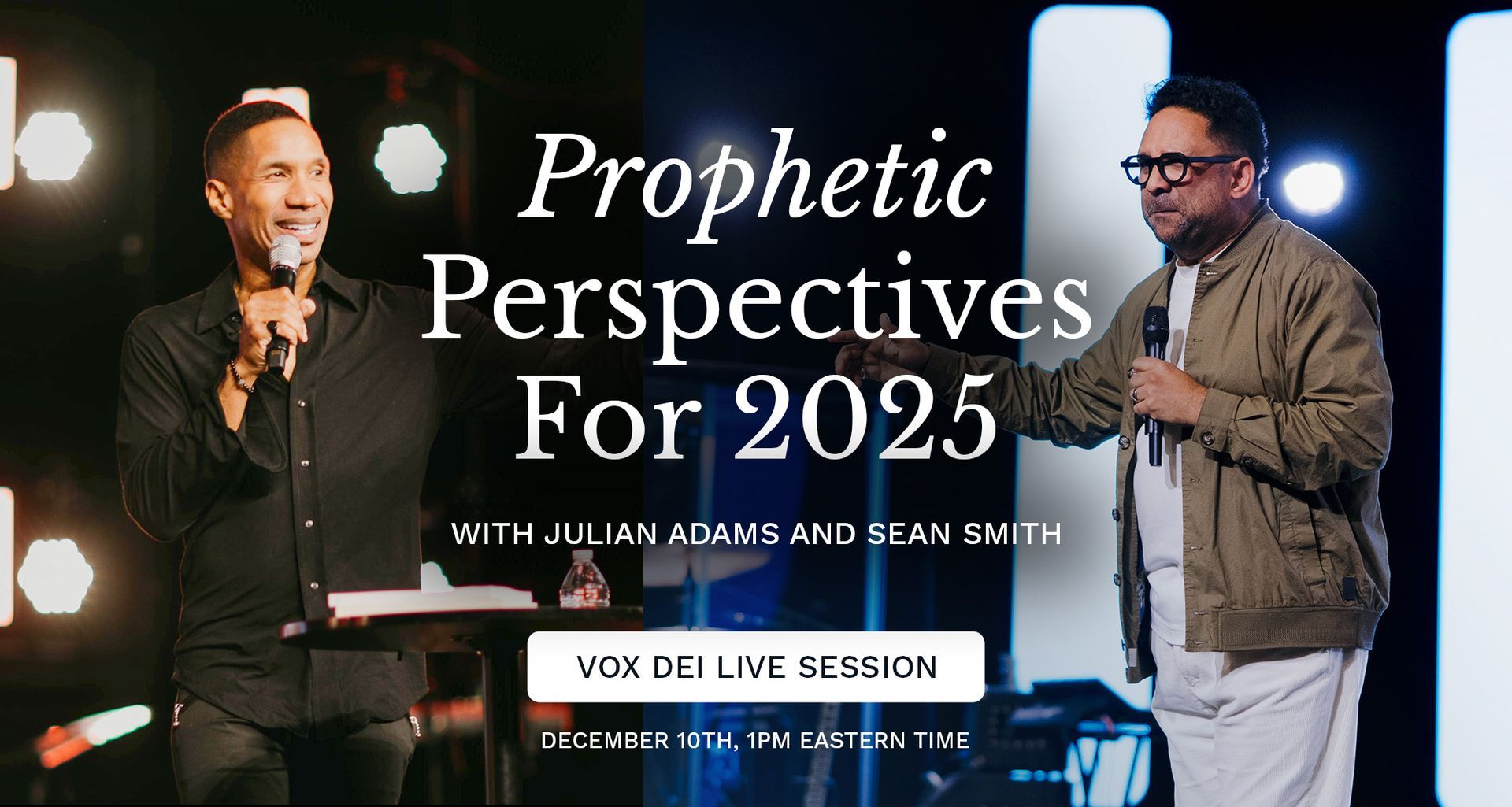Let Love Be Your Experience
Katia Adams • June 19, 2018

Ephesians 3 invites us to let love be our foundation, our comprehension and our experience. In this talk, Katia Adams and Kelly Notcutt share how they have experienced the love of God in their day-to-day lives, and encourage us to press into that very same love.
Find all our latest teachings in the podcast app for iPhone: Click here to listen and subscribe.
– TRANSCRIPT
Katia: We’re going to be speaking from Ephesians 3, tonight. If you have your bibles, feel free to flick there. But we’re going to read the verses anyway, and actually, we’re going to zoom in on just one verse, from Ephesians. Ephesians 3:19, is going to be where we really plug ourselves into. But, you know, it felt really funny this morning, I don’t know if any of you were here this morning, to hear Richard’s amazing preach.
But he finished his preach reading these verses that we’re about to read from Ephesians 3. And so, yet again, I felt a real sense of, you know, God is leading us to this passage. But, you’ll see as we talk, that this will be the most ironic preach in all the world, if all we did was speak, and then everyone go home.
Because this preach is centered around encounter, it’s centered around experience. And so, we’re gonna make sure that we don’t talk too long because we’re gonna leave plenty of time for Holy Spirit to meet with us, and do what only He can do. Listen, I cannot push really hard to conjure up an encounter for you, that’s not the way it works. But, we trust that God is a good God, who loves us enough to meet with us, right?
That’s where we’re entering in tonight. That God doesn’t just want us to speak about Him, but God wants us to know Him, in His closeness, to know Him relationally. And so, we’re going to press in, to that aspect of Him tonight. Knowing that He’s good, He’s kind, and He is eager to meet with us. I can see a few of you just with quizzical expressions.
So I just want to explain something, I had a chest infection, and I’ve been preaching a lot recently. So if you are wondering whether I’m trying to channel Barry White, it’s true. There’s a closeness of my voice to him, but I’m hoping, maybe even in this preach, that my voice will get stronger as we go.
Anyway, let’s read Ephesians 3, from verse 14. “For this reason, I bow my knees before the Father. From Him, every family, in heaven and on earth is named, that according to the riches of His glory, He may grant you to be strengthened with power, through His spirit in your inner being so that Christ may dwell in your hearts, through faith, that you being rooted and grounded in love, may have strength to comprehend with all the saints what is the breadth and the length and the height and depth, and to know the love of God that surpasses knowledge, that you may be filled with all the fullness of God.”
What I’m going to do is just set the scene. And I’m going to set the scene with three invitations that I believe God is extending to us. And then, Kelly is going to bring life to the third invitation for us. The first is, I believe God is inviting us to let love be our foundation. I love these verses right here. “You being rooted and grounded in love.”
I want to tell you, the gospel starts and ends with love. There is no other motivation in the heart of God toward us than ridiculous, overwhelming, immeasurable love for you and me. I feel, sometimes, we can make the cross and resurrection of Jesus something that’s more about our sin.
God hates sin so much that He sent His Son to die for us. Or no, no, God wants justice so much that He sent His Son to die for us. Or God is a God who is angry, and needs to bring punishment. So He sent His Son to die to take the penalty of sin.
And all of that pales in comparison to the true motivation of the heart of God, which is, John 3:16. God so loved the world that He gave His Son. He loved the world. It wasn’t your sin that was his focus. It wasn’t the penalty of sin that was his focus. It wasn’t the shame on you that was his focus. It wasn’t him needing to bring justice that was his focus. No, it was his scandalous affection for you and me that was his focus, that was his motivation in sending Jesus.
When Jesus said, “Yes, I’m going to go and I’m going to give myself for people,” it wasn’t about bringing judgment, it was about showing the affection of the Father’s heart. You being rooted and grounded in love. The invitation of the Father, to you and me tonight, firstly, is let love be your foundation, know where your journey starts.
Some of you in this room, you’ll be thinking, “This isn’t actually what I thought I signed up for when I became a Christian. I thought I was signing up for being good, or learning how to behave better, or learning how to please God.” That’s not what Christianity is about.
And some of you maybe you’ve been sitting in church for decades, and that’s what you thought Christianity was about. I want to show you tonight, love is your foundation. It’s not about your morality. It’s not about learning how to be good. God so loves you that He gave Himself for you. Because He wants to set you free so that you can be truly yourself in freedom.
Let love be your foundation, you being rooted and grounded in love. The second invitation, just to set the scene, let love be your comprehension. It’s beautiful words, verse 18, “I’m praying that you may have strength to comprehend with all the saints what is the breadth, the length, the height, and depth of His affection.”
God is inviting us to get to grips in our minds with the dimensions of His love. It’s an invitation which is slightly tongue in cheek, because He’s saying, “Come on now. Come on, I want to invite you to study this. I want to invite you to push the depths of this. I want to invite you to run as far as you can, in any direction in your mind to see if you can touch the walls, touch the edges, touch the boundary lines of my love.”
He’s saying, “Fill your mind with my affection. Let love be your study. Let love be your mental pursuit. Spend your time grappling with my affection for you.” Gosh, it’s an amazing thing to study. It’s an amazing thing to spend time in the word of. It’s amazing thing to allow our minds to be flooded with the dimensions of His love. Its height, its depth, how deep does His affection go for you?
Is it deeper than your sin? Is it deeper than your last failure? How wide does His love go for you? He’s inviting you, “Come and grapple with the boundaries of my love.” But my favorite thing about verse 18, is verse 19. “And to know the love of Christ that surpasses knowledge.” Make it your pursuit, by all means, to understand His love.
But His third invitation to us this evening, the one that we’re going to spend our time on, the one that we’re going to take Him seriously on, is let love be your experience. It’s your foundation. He’s inviting us to allow it to become our comprehension. But ultimately, He’s leading us to let it be our experience.
And I don’t know when the last time, you or I, had an experience of His love, but He’s inviting us into it tonight. I was saying to Kelly, and I’m going to finish with this, so Kelly can preach. I was saying to Kelly tonight…I was reading a book before I got here tonight called “God’s Best Friend” by a friend of mine called Gabriel Lopez. It’s a great book, read it. The more I read it, the more I kept thinking to myself, am I even a Christian?
He tells story, after story, after story of encounters. He’s a seemingly normal guy, and you read his encounters and you think, “What am I doing with my time?” Let love be your experience.
Kelly: Hi, thank you so much, Katia. Well, I just want to invite you to continue having an encounter with God’s love. We started in worship and continued when Katia was speaking now, but I just invite you that this is a time to encounter His love. I’m going to be going a little bit deeper into what His love means and…but yeah, just feel free to sit back and receive His beautiful, beautiful love.
So I’m just going to recap that verse 19, which is where I’m going to spend some time. It says, “And to know the love of Christ, which surpasses knowledge, that you may be filled up to the fullness of God, to know the love of Christ, which surpasses knowledge.” The word “love” here, is the Greek word, “Agape.” You may have heard that before. And it’s the highest form of love in the Bible.
And whenever the New Testament talks about Agape love, it’s referring to the definition that we can find in 1st John 3:16, which says, “This is how we know what love is. That Jesus Christ laid down his life for us, and we ought to lay down our lives for our brothers and sisters.” This is how we know what love is that Jesus Christ laid down His life for us.
Jesus is the ultimate expression of love. The Son of God came to earth, who died for our sins, who died for a people who never, ever could have earned it or deserved it, so that we can be redeemed and have a relationship with Him.
That is, it’s the simple gospel act. That is love. Love looks like Jesus. And it’s not a flaky kind of love. It’s not a love that’s based on feelings. It’s not a love that says, “Yes,” today and, “No,” tomorrow, but it’s a cross-bearing love. It’s a love that died for its enemies. It’s a love that was poured out and expected nothing in return. It’s all consuming, it’s never-ending, it’s outrageous, and it’s extravagant.
That is the love of Jesus. That is Jesus. So I don’t remember, when I became a Christian, I would go to a youth group on a Friday night. My parents would drop me off at, conveniently, happened to be located next to a pub. So my parents enjoyed some free babysitting. And I kind of just, I guess, grew in my knowledge that God loved me, that He was savior.
That He sent His Son Jesus to die for me. And I never went up to say a sinner’s prayer or answer an article, but I just knew, that I knew, that I knew, from a young age, that God loved me, that He really, really loved me. And somewhere, in those young years, I learned about the omnipresence of God, that God transcended space and time, and that he was everywhere, all at one time, which, for my little brain, really confused me.
And so, what I would do is, I would imagine that God was in the room. That I’d see an empty space and go, “Okay, that’s where God is, He’s in the corner over there.” And what I would think is, if God saw me now, would He be happy with what I’m doing? Would He approve of what I’m doing? Or would He be really heartbroken that I’m doing something naughty?
And as a kid, that’s what I was thinking all the time. And what that looked like, for me and my life, is that I went through my childhood and my teenage years as a really good kid, so scared to misbehave. Because what if the God that’s in the room, right over there, sees what I’m doing? What is He going to say? Is He going to come down and crack the whip and disapprove?
I believed the lie that I had to behave in order to be worthy of God’s love. And the truth is that God is not a punisher, but God is an extravagant lover. It says in 1st John 4:8
that, “God is love.” He is that very Agape love that we just spoke about. He is the love that we see demonstrated on the cross. He’s not waiting for you to step out of line. And if you do, He will take His love away, that’s not God. God is love.
That means that the very nature, the very essence of who God is, is the love that we see on the cross. He’s an extravagant lover. And today if you’ve lived your whole life believing that God is angry, that as soon as you misbehave, He’s going to crack the whip, I’m here, we’re here tonight to tell you that that’s not who God is. He’s not a lover, and He does not extend His love to us based on our behavior.
So just back to that verse 19 in Ephesians 3, which says, “That we would know the love of Christ that surpasses knowledge. That we would know the love that compelled Jesus to the cross, that we would know the very nature and the very essence of God.” And now that word, “know,” in the beginning of that scripture, is that…it means that something that we know from experience.
It’s an experience that we had, that we know, that we know, that we know that something is true. And the word “knowledge” there is head knowledge, it’s something that comes from understanding. It’s an understanding that you can have in your mind. So know experience, knowledge, and understanding.
So to rephrase a little bit, give me the liberty, I believe Paul would be saying something like, “That we would know from experience the love of Christ that surpasses the understanding of love that we have in our mind.” Now, there’s a big difference between knowing something in your head, right? And knowing something through experience.
When I was learning to drive, I got hold of…I think it’s called a K53 book or K52, I can’t remember. But, it teaches you the rules of the road, right? And I studied this thing, I still failed in my learner’s twice. But I studied this thing, and so, technically, I knew how to drive, right? But it was only until I sat in front of the steering wheel, turned the car on, dropped the clutch and stalled, did I begin to understand a little bit of what driving actually was.
And I feel like that’s exactly what Paul is hitting home in the scriptures. That we can understand, to a certain extent, what God’s love is like, based on our mind and what we can cognitively understand, but there’s so much more that’s just the starting point of the revelation of the magnitude of God’s love.
And this, to me, man, it’s so exciting because it means that what we understand, there’s so much more to that. He says, “It surpasses our knowledge.” So there’s more. So when we think we understand, when we think we’ve come to a final…this is what God’s love means, no, there’s more.
And then, when you think there’s…you’re done, no, there’s more. And there’s still more, and more, and more, and more. Like that is the extent, that’s the magnitude of God’s love. It’s just amazing, and that’s what’s available to us.
And Paul’s not saying here that our head knowledge is futile. That we shouldn’t, yeah, learn at all about God’s love, or read about God’s love, but it’s got to be more than a theological concept. There’s so much more. There’s so much more, we’re invited in this verse to experience His love. And throughout the Bible, we see countless stories of people who encounter the love of God and their lives are forever changed.
One of my favorite stories and that I always think of when I think of the power of God’s love, is the woman with the issue of blood, in Matthew 9. Now, this woman, she extends her hand through the crowd, she pushes through, and she touches the hem of Jesus’ cloak, and her life forever changes.
She receives radical healing. And now, she must have heard about this Jesus. Something must have compelled her, some kind of knowledge about Jesus must have compelled her, to stretch through the crowd, to touch the hem of His garment.
Our head knowledge, what we know about God’s love, what we read about his love, it has to compel us to experience Jesus, to experience that love, it’s got to compel us. It can’t just be theology. So just in wrapping up, and I’ll invite Katia back up, Paul’s prayer in this passage, and my prayer for you tonight is that you would encounter the love of God that surpasses your understanding. That what you’ve read about Him, what you’ve heard about Him, what you believe about Him, that you would begin to experience, that it would be…go beyond just theology.
Katia: You know, the challenge for us is that heart knowledge has a way of creeping back to become a head knowledge unless you steward it, and unless you press into it, and unless you keep pursuing it. And so, for some of us, I know this is the case for me, that there has been historical experiences of encounter with Jesus that has overwhelmed us.
But unless we live in the good of that, unless we keep saying, “And how are we going to encounter each other afresh today, Jesus,” what can happen is that beautiful moment of encounter can creep back up into your head so that it becomes theory once again.
And you’ll know if this is true of you, if you can listen to words about the love of God, or if you can read words about the love of God, and you’re kind of like, “Me? Okay.” And I don’t say that to be rude, or cheeky or funny, because I’ve been there.
And actually, sometimes, as leaders or preachers, you can get into this place in very dangerous territory, because you talk about something so often that you can kind of go, “Yeah.” It’s my job to tell you about the love of God.
But the love of God, if we’re living in the experience of it, should be so overwhelming that we’re undone when we talk about it, because it is scandalous. My husband, Julian, loves to say, “If the grace you’re experiencing isn’t amazing, then it’s not grace.”
Because it should amaze you. You should be blown away. It’s like talking to someone who’s claiming to have completely fallen in love with a person of their dreams. And when you talk to them, they’re like, “Yeah, they were kind of cool. Like, okay, you don’t know what it means to have fallen in love.”
Because once someone has fallen in love, you know when you talk to that person, because they just can’t, “Oh, let me tell you one more cute thing that he did.” And you’re like, “Oh, my gosh, this is the 10th story.” Or it’s like when someone has had a child. Listen, before I had kids, I knew the theory of what it meant to have unconditional love for a child.
But when I held Ezekiel for the first time, oh, my gosh, there was no book that could have explained what I felt. And if you just give me a few minutes to talk to you about my kids, well, the photos are going to come out and you’ll be thinking, “Oh, my gosh, make her stop.” But it’s because I’m living in the experience of that love, and it’s a daily encounter at 6:00 a.m., 5:00 a.m. It’s a daily encounter.
And so, this isn’t just for people, this isn’t for the person next to you, is what I’m trying to say. This is for you. You, who maybe have never encountered the love of God, and you’re thinking, I genuinely have no idea what you’re talking about when you talk about encounter. And this is for you who has had multiple encounters, but who are hungry today.
Because as Richard said so well today, in the spirit, in the supernatural, everything you eat makes you more hungry. And so, yesterday’s experience should be making a starving today for more. And God is never blasé about meeting with us. Oh, He loves to meet with us. Isaiah says, “He rises from His throne to show us compassion.”
He is eager to meet with you and I. And I love it because the sentence ends with, “So that you may be filled with all the fullness of God.” You know, the point of Christianity, like I said, isn’t your morality, that’s not God’s endpoint. God’s endpoint is to stuff you to the brim with the fullness of who He is.
With His glory, with His Majesty, think of the biggest words that you can think about who God is, and then understand this, that He has not reserved that simply for Himself, but He wants to stuff you to the full with that reality. You want to talk about His power, you want to talk about His creative ability, you want to talk about how He is worthy of all honor, you want to talk about His glory that shakes the nations.
And He’s saying, “Yes, that’s why I brought you home so that I could fill you with the fullness of all of that.” There’s not a single part of Him that He has held back from you, or reserved just for Himself. But in His incredible, ridiculous, scandalous grace, He said, “I want to stuff you to overflowing with that very same reality.
I wanna say to you, if you are living for your Monday to Friday, just to get through your week, if you think your Christianity is just about not gossiping at work, if you think your Christianity is just about saving time until one day, finally, you’ll die, or maybe be raptured and go to heaven. I don’t believe in the rapture, anyway, but that’s another story for a different time.
But the point is this, if you’re waiting for one day when it will be okay, I want to tell you, you haven’t scratched the surface of what it means to be a Christian. Because what it means to be a Christian today, not one day when you die, what it means to be a Christian it’s to so encounter His love that He’ll so transform you and I, that every part of His fullness will be stuffed into you and I, so that everywhere we go, we will be overflowing with the fullness of God Himself.
That’s why He saved us. It wasn’t to make your behavior good. It wasn’t so that you’d have to go through a charade of a life on earth so that you’ll get to heaven one day. It was so that you’d so encounter Him and you’d live in the fullness of who He is.
Kells, why don’t come up? We’re gonna do some ministry time. And maybe just you want to come and play keys. Guys, we don’t have a script for this part. And if you want it to be neat and tidy, I’m really sorry, it’s not going to be. But I believe God wants to meet with us.
Because if not, this word isn’t trustworthy. And we really need to stop wasting our time, if that’s the case. But if He is to be believed, then He’s to be believed completely, which means He wants to meet with you and me tonight, which means He wants to journey us from head knowledge to heart knowledge. And so, why don’t you stand with us tonight?

If you want to grow in the prophetic, it doesn’t begin with what you say. It begins with what you see. The prophetic is rooted in perception. Not just natural insight, but spiritual awareness—what Scripture calls “the eyes of your heart.” Paul prayed that the church in Ephesus would have their hearts enlightened so they could truly see what God was doing. “I pray that the eyes of your heart may be enlightened in order that you may know the hope to which He has called you…” (Ephesians 1:18) God isn’t distant or withholding. But if we’re going to hear Him clearly, we have to see differently. We need Heaven’s perspective. And that means learning to quiet the noise, tune into His voice, and let Him train our inner vision. You don’t need to wait for a dramatic vision or audible voice. Often, God speaks through a nudge. A mental picture. A scripture that lingers. A sense of burden or joy that feels holy. These are the first signs that your spiritual eyesight is awakening. But it takes time. It takes attention. It takes trust. Just like physical muscles grow with use, your spiritual senses grow as you spend time with Him—not just talking, but listening. Not just asking for answers, but asking for His perspective. You were never meant to live according to what the world says is true. You were meant to live by every word that flows from the mouth of God. A Prayer for This Week: “Lord, open the eyes of my heart. Teach me to see what You see—not just in others, but in myself, in my circumstances, in the world around me. Give me clarity and confidence to trust Your perspective more than my own. Amen.” This week, pay attention to what you notice. The way you see is often the way He speaks.

We are living in a world of dramatic change. The relentless pace of development often leaves us breathless and exhausted. The demand for innovative ways of communicating, inventing, and staying ahead of cultural trends can feel daunting and demoralizing. It can push us into a space where we find ourselves trying to copy rather than be authentic, to imitate rather than create. This pressure can lead us to believe that we need to be more creative, and that our individual stories do not matter. But nothing could be further from the truth. Your story, no matter how small, matters and is powerful. One of the remarkable aspects of ancient manuscripts, like the Bible, is that they tell the stories of individuals whose lives may seem small and insignificant. Yet, God chose to make their lives a memorial of what He could do with a life that the world deems insignificant. The incredible power of the gospel is that it changes lives one at a time. God is as interested in the individual story as He is in redeeming the cosmos. The aim of the gospel is not just dealing with personal sin; it is about restoring individuals to a relationship with a kind Father. In his book Mere Christianity, C.S. Lewis beautifully said, "The Son of God became a man to enable men to become sons of God." Justification addresses our standing before God, but our adoption invites us into a relationship with the Father. It allows us to partake of who He is and to live in a place of deep joy from who He is. Romans 3:23 reminds us that "all have sinned and fall short of the glory of God." Many of us forget that the work of salvation has turned this verse around. Through Jesus, we have been restored to the glory of God. One description of the word "glory" refers to the divine quality, the unspoken manifestation of God, and splendor. It is the revelation of God's intrinsic worth and beauty. Do you see that? We have been restored to His divine quality, splendor, and beauty. In a world where it can be easy to feel like just another face in the crowd, remember that your story is significant. Your experiences, your journey, and your voice matter. Embrace the unique narrative God has given you and let it shine. You are not just a spectator; you are a vital participant in God's grand story. Your authenticity, creativity, and individuality are valuable. As you navigate the rapid changes of our world, hold on to the truth that your story has power and purpose. God sees you, knows you, and has a plan for your life that is uniquely yours. Let us celebrate the beauty and significance of each individual story, knowing that together, we contribute to a tapestry of divine splendor and glory.



